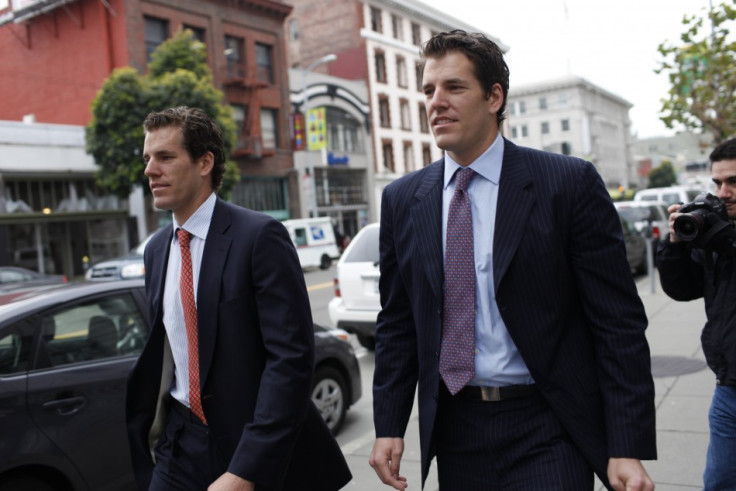Winklevoss Twins Announce £13m Bitcoin Trust Fund
Cameron and Tyler Winklevoss, the twins famous for their legal dispute with Facebook creator Mark Zuckerberg, have announced plans to float a £13m Bitcoin trust fund.

The Winklevoss Bitcoin Trust will initially sell $20m (£13m) worth of shares to investors, according to an S-1 filing made by the twins to the US Securities & Exchange Commission.
In April, the twins claimed their Bitcoin portfolio was worth $11m - equal to around 1% of all coins in existence - and that they had bought into the virtual currency when it was around $10 per coin, much less than the current value of $90.
Must Read: What is Bitcoin and how does it work?
The trust would function as a normal exchange-traded fund, but instead of focusing on stocks, the fund would be made up of Bitcoins, as reported by the New York Times, meaning traders would be buying and selling Bitcoins as their value changed; the twins' filing proposes owning five shares in the trust would be equal to one Bitcoin, pricing each share at roughly $18, as of 2 July.
Speaking to the NY Times, Tyler WInklevoss said: "The trust brings Bitcoin to Main Street and mainstream investors to Bitcoin. It eliminates the friction of buying and reduces the risks associated with storing Bitcoin while offering similar investment attributes to direct ownership."
Bitcoin is a decentralised digital currency with no central bank, and is created by computers which 'mine' coins by solving complex mathematical equations. Coins can be used to buy goods online such as pizzas, computer software and even illegal items like drugs and weapons in what's known as the Dark Web, thanks to the currency being anonymous to use.
With no central bank to adjust the value of Bitcoin for inflation, the currency automatically alters how complex the mathematical equations are, forcing computers to spend longer solving them if coins are being mined too quickly. The number of coins mined will never exceed 21 million, prompting its value to steadily rise as they become sought after; there are currently 11.3 million coins in circulation.
Risk
Under a section of their filing titled 'Risk Factors' the twins write: "The loss or destruction of a private key required to access a Bitcoin may be irreversible. The trust's loss of access to its private keys or its experience of data loss relating to the trust's Bitcoin could adversely affect investment in the shares."
The filing continues, admitting that a reduction of public interest in Bitcoin would affect the trust's share price: "The further development and acceptance of the Bitcoin network and other digital math-based asset system, which represents a rapidly changing industry, are subject to a variety of factors that are difficult to evaluate.
"The slowing or stopping of the development or acceptance of the Bitcoin network may adversely affect an investment in the share."
The value of Bitcoin has been incredibly volatile since soaring from $15 to more than $260 per coin in January, before a crash saw the value slashed to $105 in a matter of hours, as amateur traders sought to cash in on the sudden appreciation.
Volatile
Over the following days and weeks Bitcoin remained highly volatile, as exchanges like Mt. Gox, which transfer Bitcoins for real-world currencies like pounds and dollars, was subject to multiple DDoS (distributed denial of service) attacks, slowing the servers and spooking traders into selling.
The attackers would then wait for the price to fall, buy, stop the attack and sell again once the price had recovered.
Despite the extreme volatility and interest from cyber-attacks, the Winklevoss twins claim shares in their trust are "designed for investors seeking a cost-effective and convenient means to gain exposure to Bitcoins with minimal credit risk."
The twins have set up Math-Based Asset Services LLC as the trust's sponsor, but accept that both the sponsor and its management "have no history of operating an investment vehicle like the trust, their experience may be inadequate or unsuitable to manage the trust."
© Copyright IBTimes 2025. All rights reserved.






















